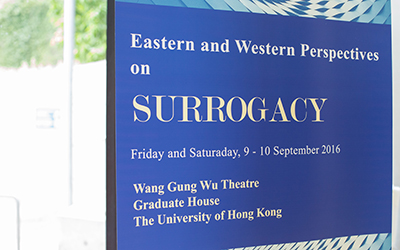 The Law Commission of England and Wales is currently undertaking consultations with regard to its 13th Programme of Law Reform, seeking suggestions concerning which areas of law would benefit from reform. One of the areas identified by the Law Commission was a review of the law surrounding surrogacy arrangements, where concerns have been expressed as to whether the law is keeping pace with social change.
The Law Commission of England and Wales is currently undertaking consultations with regard to its 13th Programme of Law Reform, seeking suggestions concerning which areas of law would benefit from reform. One of the areas identified by the Law Commission was a review of the law surrounding surrogacy arrangements, where concerns have been expressed as to whether the law is keeping pace with social change.
This is a question of great relevance to Cambridge Family Law. Director of the Centre, Jens M Scherpe, and Centre Member Claire Fenton-Glynn are currently undertaking a research project on “Eastern and Western Perspectives on Surrogacy”, in conjunction with Terry Kaan, University of Hong Kong. In September 2016, they held an international conference in Hong Kong, bringing together speakers from 16 jurisdictions to discuss the difficulties facing the regulation of surrogacy in a globalised world. Details of the conference can be found here. The findings of this conference and comparative research project will be published by Intersentia Publishing in 2017.
In this light, Cambridge Family Law has made a submission to the Commission, emphasising the need for wholesale and systematic reform of this area. The submission outlines the problems with the current regulation of surrogacy, and in particular, the outdated, uncertain, and ineffective nature of the law.
The submission sets out the difficulties of enforcing the current law, highlighting the deficiencies of an ex-post facto system of recognition of surrogacy arrangements, which is easily circumvented by commissioning parents. It argues that this leaves surrogate mothers, and children born through surrogacy, in a vulnerable position, and without the effective protection of the law. Furthermore, the submission explains the discriminatory nature of the law, which allows wealthy commissioning parents to circumvent legal rules, but is also prejudicial to single parents, women with fertility problems, and those using donor sperm in the surrogacy arrangement. Finally, the Submission argues that the law fails to protect commissioning parents by not facilitating, and in many ways preventing, professional support for commissioning parents and surrogates.
The submission concludes that by failing to provide an effective system, commissioning parents are simply leaving the jurisdiction to complete surrogacy arrangements in other countries, thus circumventing restrictions in place in English law. The current law does not reflect the realities of modern attitudes towards surrogacy, nor recognise the nature of our globalised world, and the desire for a child for those parents who require surrogacy appears to be greater than the barriers erected by Parliament.
The question to Law Commission put was “Is the law governing surrogacy keeping pace with social change?” The answer to that is a clear “no”. As set out in the submission, this area of law is in dire need of reform. Cambridge Family law therefore very strongly recommends that the law of surrogacy should be part of the Law Commission’s 13th Programme on Law Reform.


 Twitter
Twitter Email
Email